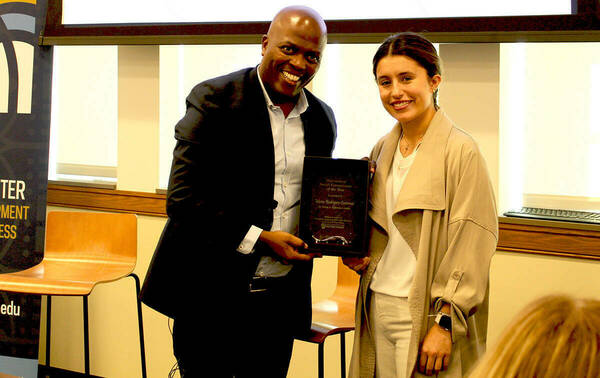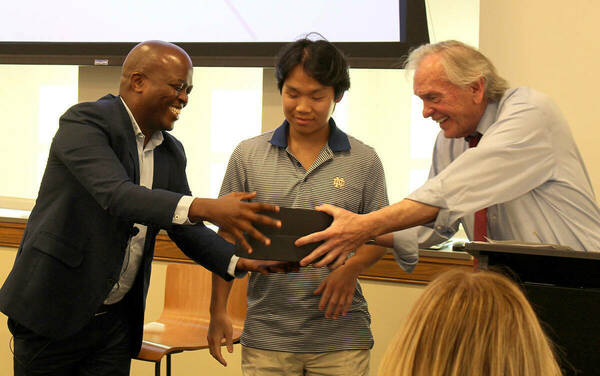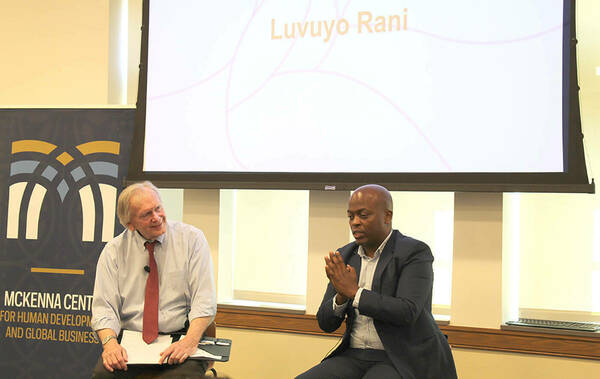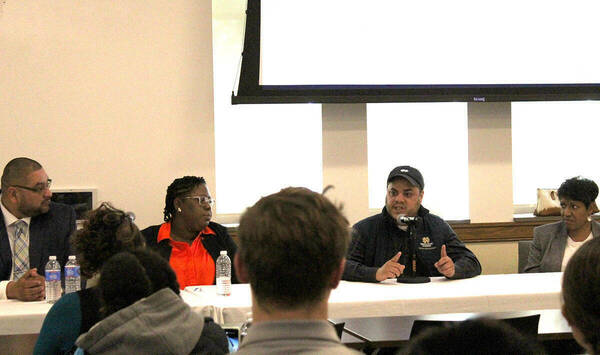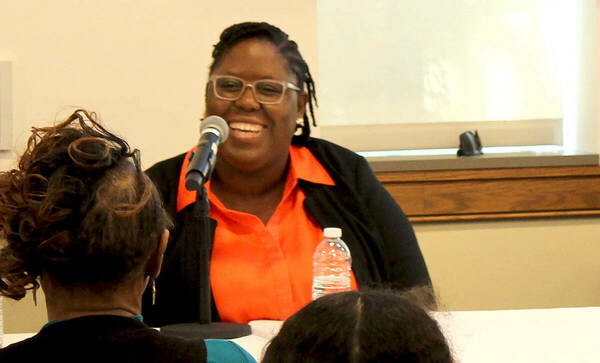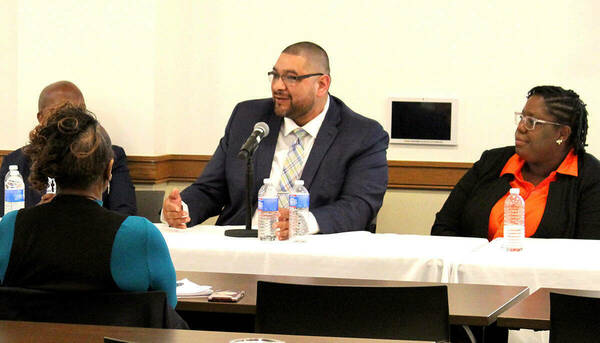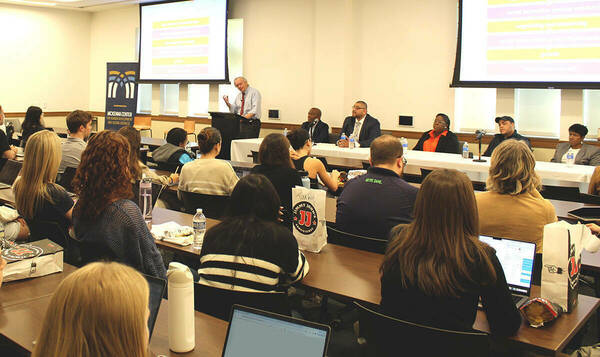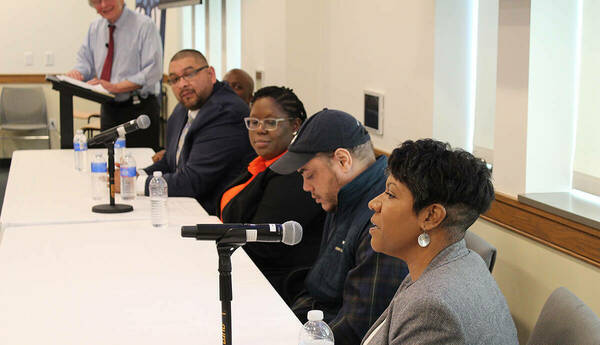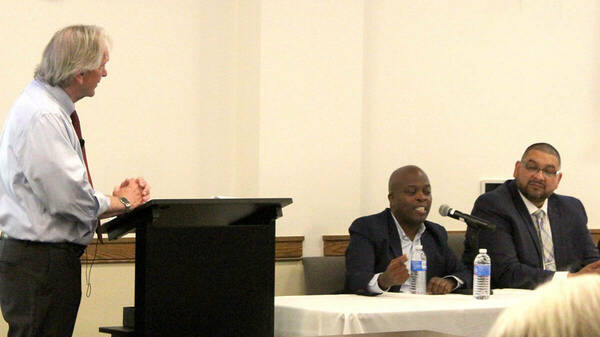Students and business leaders unite every April for the Keough School's Social Entrepreneurship Day, which celebrates entrepreneurs making significant contributions to advancing a more equitable world through innovative solutions.
The annual event, sponsored by the McKenna Center for Human Development, in collaboration with the Pulte Institute and the Center for Social Concerns, showcases social entrepreneurs who have broken ground and continue to make strides using business-minded strategies to address social challenges.
Keough School Global Affairs majors Maria Rodriguez Contreras, ’26, and Justin Hur, ’26, were honored for their economically viable and inclusive startups.
Rodriguez, the Outstanding Social Entrepreneur of the Year award recipient, is the mastermind behind Blink — a digital wallet that aims to provide affordable digital transactions for merchants of all sizes. Rodriguez says with Blink, she hopes to "set a new standard for financial inclusivity in regions throughout Latin America that major financial institutions have traditionally underserved." Rodriguez, from Bogotá, Colombia, is also pursuing a major in economics with a minor in real estate.
Hur received the Keough School's Excellence in Social Entrepreneurship award for his “dedication and innovative spirit.” Hur's venture, Grocero, began in high school in Atlanta and extends into his college career. With Grocero, Hur aims to establish micro-fulfillment centers for fresh produce in food deserts, empowering local growers and enhancing food security for low-income residents. He is also working with classmates to build a B2B Software-as-a-Service (SaaS) company called Thrift Plea, which aims to help resale stores balance affordability and profitability.
Shaping Hur’s career path is his pursuit of the Social Entrepreneurship and Innovation minor — housed within the Keough School and overseen by the Pulte Institute and McKenna Center — where undergraduate students combine business principles with real-world problem-solving and the tools to embark on social ventures.
The event also featured a panel discussion with Urban Poverty and Business Initiative partner Luvuyo Rani, who rose from poverty in South Africa to co-found Silulo Ulutho Technologies, and four of the program's graduates:
-
- Ruben Gaona, founder of My Way Out, offers job training and placement for individuals returning from incarceration;
- Joe Luten, founder of Importin' Joe's Ethiopian Coffee, works to counteract the effects of poverty through coffee bean sales;
- Chandra Williams, founder of Goddess of the Moon Leatherworks, offers one-of-a-kind leather handbags and accessories and meaningful employment for individuals with autism; and,
-
Leslinda Wilson, founder of Blossom Cleaning & Organizing, supports immigrants with jobs and a dignified livelihood.
The McKenna Center's Urban Poverty and Business Initiative offers six weeks of entrepreneurship training — one-on-one mentoring from successful business owners, connections to local, national, and global resources, and access to a microcredit program. UPBI has 37 programs worldwide and has helped to launch over 600 small businesses over the past year, contributing to economic empowerment in urban areas from Ahmedabad, India, to San Diego and South Bend.
Keough School Professor of the Practice Michael Morris, who oversees the initiative, moderated a panel discussion asking the social entrepreneurs how they create sustainable solutions to problems while generating revenue and impact.
Here are top takeaways:
The path is seldom smooth: Rani shared harrowing adversities that forced him to rethink and retool his business model. Silulo Ulutho Technologies began in 2004 as an internet café in Khayelitsha, a township near Cape Town, to provide digital and computer literacy services. Over the past 20 years, Silulo Ulutho Technologies expanded its operations to include computer training, digital skills development, IT services, and the sale of computer equipment — while playing a significant role in bridging the digital divide in South Africa by providing affordable access to technology and training programs to empower individuals with digital skills, particularly in underserved communities.
A traumatic robbery in 2014 marked the beginning of a tumultuous period. Rani and a colleague were bound and threatened, an experience that left deep psychological scars and caused him to question his entrepreneurial voyage. A devastating fire obliterated his office, and Rani suffered a significant financial setback when funds earmarked for property acquisition were embezzled. Then, the COVID-19 pandemic unleashed another wave of uncertainty when Rani made the heart-wrenching decision to let go of 35% of his staff and close two stores.
"While we were going through these moments, we focused on the good things also happening and managed to pivot," Rani said. "It's about waking up and trying again."
Viable businesses can transcend traditional boundaries: Wilson, the founder of Blossom Cleaning & Organizing, said being selective about her clients has been an effective strategy, allowing her to focus on people who value her services, are willing to pay her rates, and are a good fit for her business model. "My passion is to pay a quality-of-life wage for each of my employees, not just a livable one. I don't want the baseline," Wilson said. "I hire immigrants. I hire people with disabilities. I hire passionate people who provide quality services."
It is possible to weave together family, work, and innovation: Wilson transitioned from architecture to founding Goddess of the Moon Leatherworks to create luxury goods while integrating personal challenges into a socially conscious business. Wilson is the mother to two sons on the autism spectrum, whom she now employs. "My goal is to become a black woman-owned luxury leather brand, but I want to do it by employing people with developmental disabilities," Wilson said. "I try to get leather from animals that haven't been killed for their hides and use tanneries that aren't hard on the environment. I am working to create a guilt-free luxury leather experience, and I want to do that alongside people like my sons."
A new definition of success: Societal impact and financial performance are not mutually exclusive; they can be mutually reinforcing. Gaona's dedication to helping formerly incarcerated individuals reintegrate into society is a testament to his values of redemption and community service. Luten's business model incorporates giving back to the South Bend community and ethically sourcing coffee beans from Ethiopia.
Despite Gaona's challenges re-entering society after incarceration, he founded My Way Out to reduce recidivism through technology and living wage jobs, illustrating his significant personal and professional transformation.
This theme is echoed in Luten's journey. Importin' Joe's began importing and selling Ethiopian coffee during the pandemic and thrived despite the odds. The business now operates from a 5,000-square-foot facility, capable of producing about 40,000 pounds of coffee per month. Luten allocates 30% of his profits to addressing poverty to support marginalized communities in spite of financial challenges — a testament to his intertwining of business acumen and desire to make a social impact.
To learn more about the Social Entrepreneurship and Innovation minor, contact Academic Advisor Sarah Genz.For a list of businesses started by UPBI graduates in South Bend, visit supportSBentrepreneurs.com.
Photos from Social Entrepreneurship Day 2024
